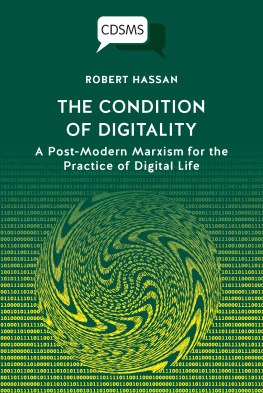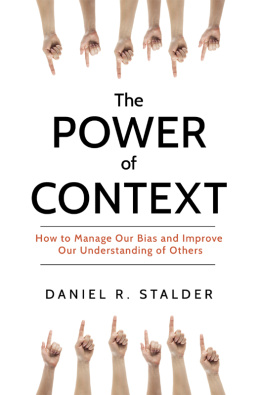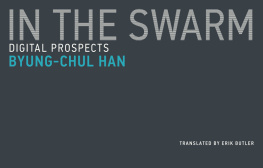Preface to the English Edition
This book posits that we in the societies of the (transatlantic) West find ourselves in a new condition. I call it the digital condition because it gained its dominance as computer networks became established as the key infrastructure for virtually all aspects of life. However, the emergence of this condition pre-dates computer networks. In fact, it has deep historical roots, some of which go back to the late nineteenth century, but it really came into being after the late 1960s. As many of the cultural and political institutions shaped by the previous condition which McLuhan called the Gutenberg Galaxy fell into crisis, new forms of personal and collective orientation and organization emerged which have been shaped by the affordances of this new condition. Both the historical processes which unfolded over a very long time and the structural transformation which took place in a myriad of contexts have been beyond any deliberate influence. Although obviously caused by social actors, the magnitude of such changes was simply too great, too distributed, and too complex to be attributed to, or molded by, any particular (set of) actor(s).
Yet and this is the core of what motivated me to write this book this does not mean that we have somehow moved beyond the political, beyond the realm in which identifiable actors and their projects do indeed shape our collective existence, or that there are no alternatives to future development already expressed within contemporary dynamics. On the contrary, we can see very clearly that as the center the established institutions shaped by the affordances of the previous condition is crumbling, more economic and political projects are rushing in to fill that void with new institutions that advance their competing agendas. These new institutions are well adapted to the digital condition, with its chaotic production of vast amounts of information and innovative ways of dealing with that.
From this, two competing trajectories have emerged which are simultaneously transforming the space of the political. First, I used the term post-democracy because it expands possibilities, and even requirements, of (personal) participation, while ever larger aspects of (collective) decision-making are moved to arenas that are structurally disconnected from those of participation. In effect, these arenas are forming an authoritarian reality in which a small elite is vastly empowered at the expense of everyone else. The purest incarnation of this tendency can be seen in the commercial social mass media, such as Facebook, Google, and the others, as they were newly formed in this condition and have not (yet) had to deal with the complications of transforming their own legacy.
For the other trajectory, I applied the term commons because it expands both the possibilities of personal participation and agency, and those of collective decision-making. This tendency points to a redefinition of democracy beyond the hollowed-out forms of political representation characterizing the legacy institutions of liberal democracy. The purest incarnation of this tendency can be found in the institutions that produce the digital commons, such as Wikipedia and the various Free Software communities whose work has been and still is absolutely crucial for the infrastructural dimensions of the digital networks. They are the most advanced because, again, they have not had to deal with institutional legacies. But both tendencies are no longer confined to digital networks and are spreading across all aspects of social life, creating a reality that is, on the structural level, surprisingly coherent and, on the social and political level, full of contradictions and thus opportunities.
I traced some aspects of these developments right up to early 2016, when the German version of this book went into production. Since then a lot has happened, but I resisted the temptation to update the book for the English translation because ideas are always an expression of their historical moment and, as such, updating either turns into a completely new version or a retrospective adjustment of the historical record.
What has become increasingly obvious during 2016 and into 2017 is that central institutions of liberal democracy are crumbling more quickly and dramatically than was expected. The race to replace them has kicked into high gear. The main events driving forward an authoritarian renewal of politics took place on a national level, in particular the vote by the UK to leave the EU (Brexit) and the election of Donald Trump to the office of president of the United States of America. The main events driving the renewal of democracy took place on a metropolitan level, namely the emergence of a network of rebel cities, led by Barcelona and Madrid. There, community-based social movements established their candidates in the highest offices. These cities are now putting in place practical examples that other cities could emulate and adapt. For the concerns of this book, the most important concept put forward is that of technological sovereignty: to bring the technological infrastructure, and its developmental potential, back under the control of those who are using it and are affected by it; that is, the citizens of the metropolis.
Over the last 18 months, the imbalances between the two trajectories have become even more extreme because authoritarian tendencies and surveillance capitalism have been strengthened more quickly than the commons-oriented practices could establish themselves. But it does not change the fact that there are fundamental alternatives embedded in the digital condition. Despite structural transformations that affect how we do things, there is no inevitability about what we want to do individually and, even more importantly, collectively.
Zurich/Vienna, July 2017
Acknowledgments
While it may be conventional to cite one person as the author of a book, writing is a process with many collective elements. This book in particular draws upon many sources, most of which I am no longer able to acknowledge with any certainty. Far too often, important references came to me in parenthetical remarks, in fleeting encounters, during trips, at the fringes of conferences, or through discussions of things that, though entirely new to me, were so obvious to others as not to warrant any explication. Often, too, my thinking was influenced by long conversations, and it is impossible for me now to identify the precise moments of inspiration. As far as the themes of this book are concerned, four settings were especially important. The international discourse network nettime, which has a mailing list of 4,500 members and which I have been moderating since the late 1990s, represents an inexhaustible source of internet criticism and, as a collaborative filter, has enabled me to follow a wide range of developments from a particular point of view. I am also indebted to the Zurich University of the Arts, where I have taught for more than 10 years and where the students have been willing to explain to me, again and again, what is already self-evident to them. Throughout my time there, I have been able to observe a dramatic shift. For today's students, the new is no longer new but simply obvious, whereas they have experienced many things previously regarded as normal such as checking out a book from a library (instead of downloading it) as needlessly complicated. In Vienna, the hub of my life, the World Information Institute has for many years provided a platform for conferences, publications, and interventions that have repeatedly raised the stakes of the discussion and have brought together the most interesting range of positions without regard to any disciplinary boundaries. Housed in Vienna, too, is the Technopolitics Project, a non-institutionalized circle of researchers and artists whose discussions of techno-economic paradigms have informed this book in fundamental ways and which has offered multiple opportunities for me to workshop inchoate ideas.






